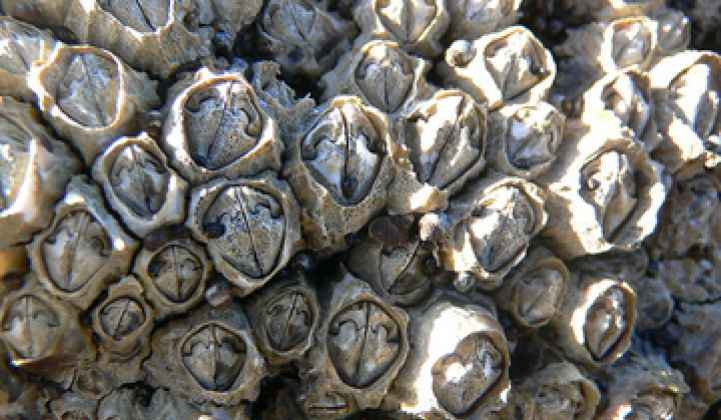GOTEBURG, SWEDEN --- Medetomidine was invented to tranquilize aggressive animals, but it also might help shipping companies curb marine pollution.
I-Tech, a relatively small company based in Goteborg, Sweden, has discovered that the sedative acts as a stimulant on barnacles. As a result, it potentially can become a substitute for copper as the primary anti-fouling material in marine paint.
“We don’t kill the organisms. We just scare them. We change the behavior of the barnacle larvae,” said Lena Lindblad, I-Tech’s R&D manager who discovered the properties. “It [medetomidine] inhibits secretion of a substance that gets them to stick.”
The company has tested the material in the Baltic Sea since 2009 and currently is conducting tests in Asia with a shipping company. In the U.S., the Navy “is actively interested,” she said. The Environmental Protection Agency will meet with the company next month.
While copper paints have been employed for years to prevent barnacles from attaching to the hulls of ships, the metal is toxic to marine life. It also flakes. Approximately 35,000 to 40,000 tons of the metal get dispersed into the oceans each year.
California has already passed regulations barring copper-based paints on pleasure craft and passenger ships. Washington state may soon follow. Commercial boats get repainted approximately every five years and pleasure craft get repainted every year, according to managing director Per Jansson. (Other companies and organizations have begun to hone in on greening ports.)
Besides its environmental impact, copper has become a financial albatross. Prices have more than doubled over the past few years and will likely remain volatile. A single liter of marine paint might contain $4 to $5 worth of copper, he said. If a ship requires six tons of paint, copper will account for three tons of the total.
“Fifty percent of the paint matrix is copper,” Jansson said.
Yet, shipping companies need it. Turbulence from barnacles can double a ship’s fuel consumption, according to Lindblad.
Enter Selektope, I-Tech’s brand name for medetomidine. Selektope is also toxic to marine life, but only a tiny amount is required. Approximately one gram of Selektope can keep a hull as clean as 500 grams of copper.
“We are five magnitudes below toxic levels,” Lindblad said.
The material also breaks down in the water, unlike copper, so the toxic effects are temporary.
Potentially, the lighter weight could marginally increase fuel efficiency.
Jansson said that I-Tech will be able to compete with copper at its current prices. However, laboratory and manufacturing facilities need to scale. Still used primarily as a pharmaceutical, only a token number of kilograms of medetomidine currently get manufactured each year.
I-Tech, which has obtained some intellectual property protection for exploiting the drug for marine applications, will likely license or partner to move into volume production.
The discovery, Lindblad says, was somewhat accidental. She tested it on barnacle larvae expecting that it would sedate and slow them down. Instead, it caused them to become hyperactive and float away.
I-Tech will show off its technology later this year at an event at Stanford. Like Denmark, Israel, Finland and others, Sweden is increasing its efforts to convert its scientific expertise into commercial applications. The Stockholm Royal Seaport project, an eco-neighborhood touting green architectural advances and smart grid technologies, will serve as a test bed for technologies with export potential.
Also check out Seec (solar-enhanced geothermal) and Svenska Aerogel (inexpensive aerogels).



